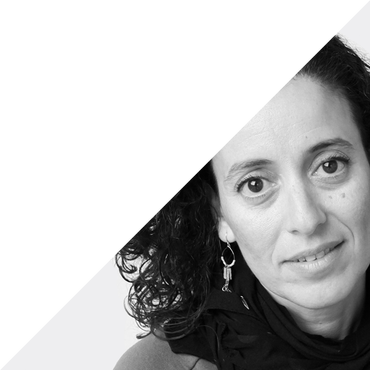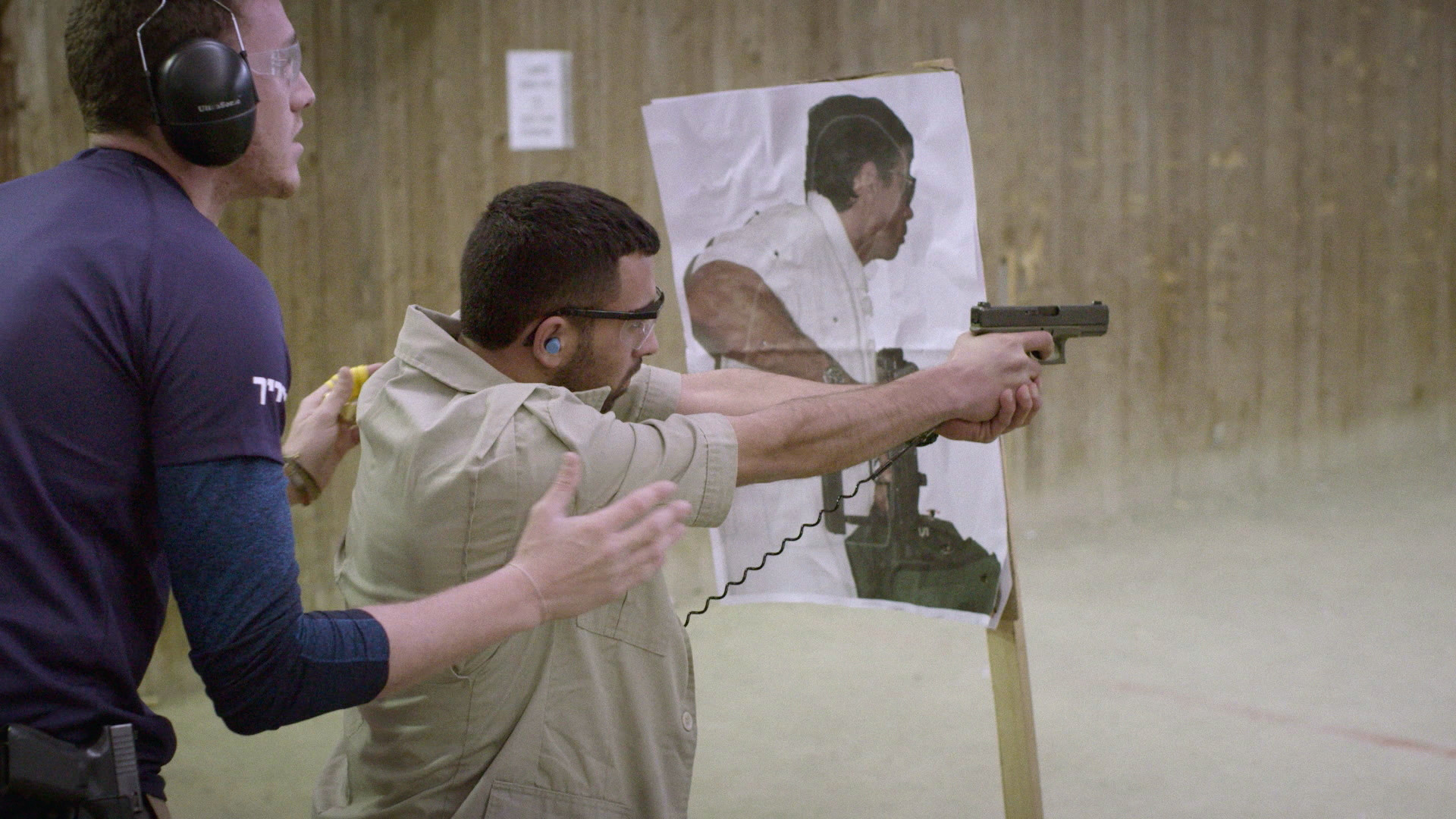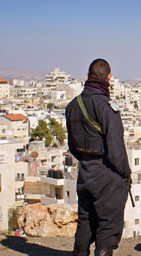Amsterdam’s Schiphol Airport, 7 a.m. My film crew and I are waiting for our equipment to clear before proceeding to check-in counter. We notice the presence of young, heavily-armed border police. I see an Arab-looking man disappearing behind a counter and appearing again from the other side. He seems to be going back and forth with no apparent goal. I keep my eyes on him and catch myself thinking: What is he doing?
“What are you looking at?” my cameraman asks me. “Um, just daydreaming,” I mumble.
The check-in area for our flight starts getting crowded with people speaking Hebrew. I calculate 100 meters to the first armed guard, and I check for the closest exit. My eyes meet the eyes of another man I don’t know. He asks me in Hebrew, “Did you see him?”
I realize we’ve been watching the same person. “What are you two looking at?” my cameraman asks again. He doesn’t see what we see; he’s not Israeli.
Another person in civilian dress approaches the wandering man and escorts him outside, asking if everything is okay. The man I don’t know says, “Ah, an undercover security agent took care of him. I’m Ron, by the way. Are you flying home?”
I am on my way to the International Homeland Security and Cyber Conference in Tel Aviv. This event, held every other year, gives the Israeli security industry the chance to showcase “an extensive array of outstanding and innovative technologies specifically designed to counter a variety of threats in an ever-changing world.”
Since attacks in London and Madrid, and more recently Paris and Brussels, my world does indeed seem to be changing. But I would like to use my Israeli insight to question whether these “innovative technologies” are really the kind of solution we want.
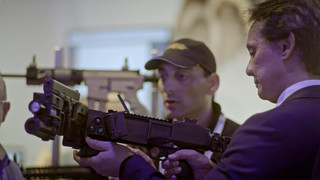
Stills from the documentary ”State of Alert, Israel style”
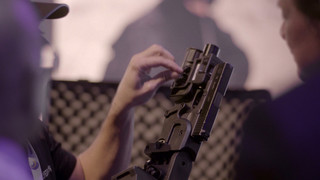
Israel as a beacon of security expertise
Walking around the conference, a booth from an Israeli company called Magal Security Systems immediately catches my eye. A sample robo-guard patrols up and down a few meters of fence as attendees look on. A big screen TV touts the company’s achievement surrounding Israel with physical barriers. The stand is crowded with interested people. Some African customers are excited to tell me that Magal did a great job building fences in Kenya.
“Israel has the experience,” says a salesman from Magal. “Israel can be a beacon of knowledge about security.” He argues that “a tsunami of refugees that forces Europe to consider its physical borders. These borders may not need to be as hermetic as those we’ve build around Gaza... but Magal will be happy to offer soft borders as well.”
When Donald Trump was elected president, the specter of his border wall with Mexico sent Magal stock soaring by 30%
Magal is the world’s top brand in this business. When Donald Trump was elected president, the specter of his border wall with Mexico sent Magal stock soaring by 30%. Today, it’s up 60% over pre-election levels. Magal turns security threats into a model of profit. The company is listed on NASDAQ, but continues to highlight its Israeli origin as an important part of its marketing.
One of this year’s 1,500 international guests is the Belgian Minister of Security, Jan Jambon. Since the 2016 terror attacks in Brussels, Jambon’s budget has increased and he’s looking for better ways to protect his country.
During a panel discussion, Jambon states that Belgian people seem to accept the new security measures as necessary. The attacks sparked a growing security culture, he says. When I ask him whether he has concerns about this new state of security, he says, “There are always outliers, but opinion polls show that some 70 to 80% of the public supports the new measures.”
For Jambon, Israel is some kind of prophecy. But I know that Israel and its security system also contain a warning.
Still from the documentary ”State of Alert, Israel style”
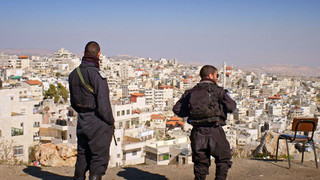
Just how big is this industry?
Following 9/11, “homeland security” became the new buzzwords for the weapons and security industry. Companies everywhere used it to rebrand themselves.
Homeland security had hardly existed as an industry in Israel before 2001. But since 9/11, business is booming. In 2016 alone, the export of Israeli security products and services amounted to $7.5 billion, or 14% of Israel’s total exports.
When I ask Menna who he’s selling to, he answers, “Whoever wants to buy.”
Menna Bacharach, an influential security advisor specializing in protecting airports, meets us in the lobby of the conference. He’s our guide and shows us around the event full of security products, ranging from smart fences to drone jammers, sniffing technology to facial recognition.
The air hangs heavy with words like “terror,” “enemy,” and “danger.” They’re uttered by well-dressed salesmen, and used in brochures and marketing films of the participating companies. When I ask Bacharach who he’s selling to, he answers, “Whoever wants to buy.”
But who’s selling and who’s buying? And what? Gathering data about deals in this business is a challenge. People we meet are happy to talk to us, even in front of the camera, but they keep their real business off the record.
It is known, for example, that Israel’s fingerprints are all over the militarization of the Los Angeles Police Department, and even disreputable regimes in Africa, but no one wants to confirm such transactions. As one salesman puts it, “No one likes to admit going to a hooker.”
The ramifications of profiling
Though official export statistics are available, the precise value of the Israeli security industry’s exports is tough to calculate.
First of all, nearly all weapons companies offer not only products, but also training packages and security services. Therefore the line between a weapons company and a security company is almost impossible to draw. Secondly, Israeli export statistics deem security companies part of the service sector, alongside cleaning services.
This system leads to racial discrimination and intimidating encounters for anyone that fits the profile
Bacharach says that he works in a lot in Africa, and in the US after 9/11, but very little in Europe. “Europeans have the mentality of people who live well, and don’t want to think about tomorrow,” he explains. “Today’s new reality will force the Europeans to change. Simply because above all, security is the task of the state – to keep its citizens safe.”
Bacharach smiles as he dismisses European airport security methods that focus on luggage. The Israeli model focuses on profiling individuals. “We know that 99% of the passengers are innocent. So we focus on the ones we define as suspicious. We do it by interviewing them, isolating them, by recovering as much data as we can, even with no intelligence involved.” The profile is based on analysis of past attacks and future scenarios. “If we feel suspicion, we seek to eliminate that suspicion.”
Profiling is the most controversial element of the Israeli model. This system leads to racial discrimination and intimidating encounters with anyone that fits the profile. While the security considerations are very convincing, they do not take into account the brutality and intimidation of the security checks. Lately a growing trend is to refuse entry to people with specific political agendas, which is a slippery slope. The result of many years of profiling marks whole communities as suspicious, and in turn makes these communities suspicious of the Israeli state.
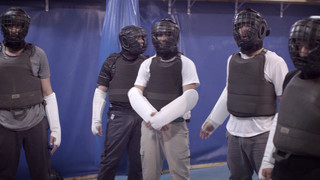
From the documentary ”State of Alert, Israel style”
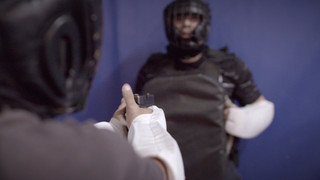
“Recently, airlines have primarily had to deal with terrorists from the Middle East,” Bacharach asserts. “Not from Sweden or the Netherlands. “That doesn’t mean all Muslims, or all people with Arabic features, are terrorists – of course not. But this is the reality. Should we just ignore it? Should I go looking for Swedes or Norwegians? I’m looking for those who are behind the terror.”
I begin to fear that my film will provide a podium to these security experts to convince the world their products are born of necessity
The sterile environment at the conference starts to get to me. The marketing here focuses solely on the experience Israel has accrued over 70 years of war, terror, and conflict. There’s no mention of occupation, human rights, or Palestinian suffering – nothing that could harm sales. Even the impact of the strong security measures on the daily life of Israeli citizens remains unspoken.
I begin to fear that my film will provide a podium for these security experts to convince the world their products are born of necessity.
Pure mechanized efficiency
The Israeli-Palestinian border, 4 a.m. In the next two hours, 8,000 Palestinian day laborers will be screened before they make their way to work on the other side of the wall.
Erez, head of Israel’s Sha-ar Efriam checkpoint, proudly shows me around. The checkpoint is an example of pure mechanized efficiency: There is no human contact. The Palestinians identify by placing their finger on a device and scanning their biometric card, a peep follows within 8 seconds and the turnstile opens.
I can’t help thinking that it would be easy for an Israeli to almost forget that these checkpoints are a direct result of their country’s occupation of Palestinian Territories
Air conditioning is installed everywhere, cleaners are on stand-by – and there are even flowers at the entrance to the checkpoint. Most Palestinians pass through in under 15 minutes, unless they raise suspicion. In that case they will be isolated and subjected to a thorough check. The armed guards are not soldiers; they work for private security contractors. The guards walk the bridges above the entrance and have no contact with the passengers. “It’s even faster than the airport,” Erez says smiling. He likes to portray it as “a service and not a military experience.”
I can’t help thinking that it would be easy for an Israeli to almost forget that these checkpoints are a direct result of their country’s occupation of Palestinian Territories. That this efficient security procedure causes great difficulties to Palestinians’ everyday lives.
After a short visit to the Palestinian side I can drive with my car through another checkpoint designed only for Israelis. There I only have to say good morning to the guard and drive through.
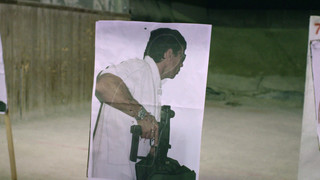
From the documentary ”State of Alert, Israel style”
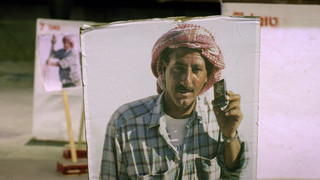
And databases full of biometrics
Israel developed advanced security methods to defend itself, to manage and screen whole communities, to create separation. The biometric card system I just saw at the checkpoint is a form of identification that recognizes and analyzes an individual based on their physical and biological traits.
Biometrics cards were introduced in Israel in 2005. Without consent of the Palestinians, this system was installed and tested at the Erez crossings between Israel and Gaza. Now it is being used in airports all over Europe.
This shows how a technological solution leads to a new policy, without ever being subjected to public debate
This technology radically transformed the way governments screen and identify people. Now there are databases of biometric information, connecting people’s identity to their biological properties.
The introduction of the biometric card shows perfectly how a technological solution leads to a new approach – eventually a new policy – without ever being subjected to public debate. Basically, Hewlett-Packard and its Israeli joint venture EDS, which developed this card, realized that the occupation presented them with an opportunity to test their new invention.
This resulted in Israel’s biometric data law, which obliges all citizens to submit their fingerprints and retina scans. This data is then linked to all other personal data. This February the law was finally signed into law by the Knesset , making it obligatory for all Israeli citizens.
And so we import fear and conflict
Bacharach had already explained to me that Israel operates as a tight system of security circles. It starts with the wide-angle view of the intelligence agencies and then progresses to physical borders, the police, and finally an inner circle of private security.
The Israeli philosophy is risk assessment and prevention. If a terrorist is already in the airport, it’s too late. At that point, all that’s left is the final circle of security: the Israeli people who are always super alert, many with military training, and ready to act upon suspicion. A terrorist in an Israeli airport – if he managed to get there at all – would likely be detected and neutralized in no time.
I know what Bacharach means. I am that person. I profile. I assess risks. I see danger everywhere. Even when I don’t want to. The man at Schiphol Airport in Amsterdam that was escorted out of Terminal 3 turned out to be merely lost and confused.
Israel is a laboratory for the security and weapon industry, a breeding ground for technologies and procedures that the rest of the world enthusiastically imports. But marking communities as suspicious isolates them, creating new dangers. It disrupts lives and fosters resentment.
When we import Israel’s innovations, we also import its mentality. We import the fear, the conflicts, the intifada, the war.
Thank you to Simon van Melick, who co-authored this piece. This article is part of Security for Sale – investigative reporting by De Correspondent on Europe’s security industry in partnership with 22 journalists from 11 European countries. Security for Sale is made possible by Journalismfund.eu
More from De Correspondent:

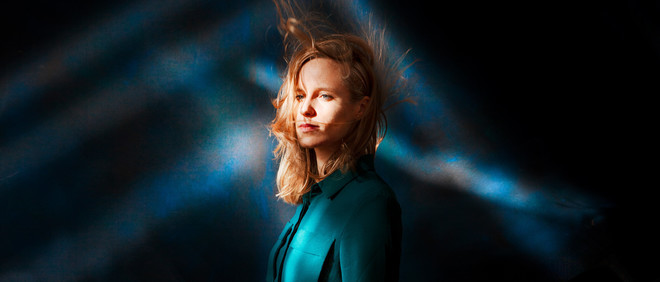 How the brokers of fear plan to make us safer
The European Union is taking an increasing role in public safety. That makes it important to understand how policy makers and lobbyists think about security. Marijn Hoijtink has spent years researching the question. This is what she found.
How the brokers of fear plan to make us safer
The European Union is taking an increasing role in public safety. That makes it important to understand how policy makers and lobbyists think about security. Marijn Hoijtink has spent years researching the question. This is what she found.
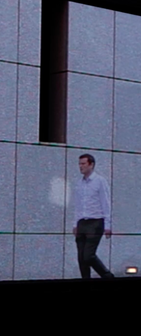
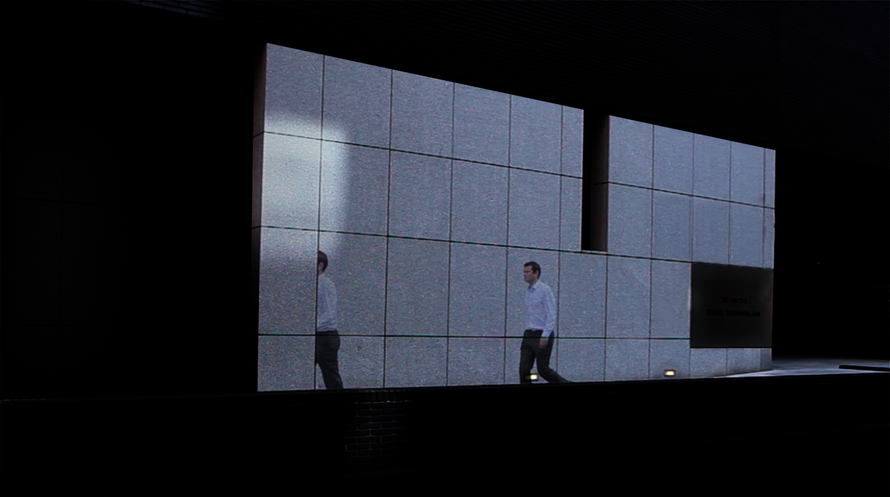 Security for Sale. The price we pay to protect Europeans
A year long, we worked with 22 journalists in 11 EU countries to investigate the European security sector. The result is Security for Sale, which brings you up to speed on this burgeoning sector. The EU has deep pockets when it comes to security. But who reaps the benefits of generous subsidies? The public or the security industry itself?
Security for Sale. The price we pay to protect Europeans
A year long, we worked with 22 journalists in 11 EU countries to investigate the European security sector. The result is Security for Sale, which brings you up to speed on this burgeoning sector. The EU has deep pockets when it comes to security. But who reaps the benefits of generous subsidies? The public or the security industry itself?
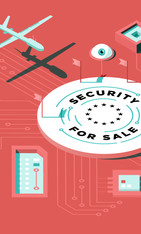
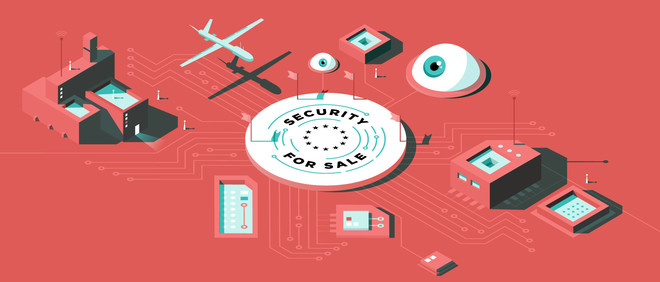 How billions vanish into the black hole that is the security industry
The European Union spends billions on research into advanced technologies meant to make society safer. But our investigation – with 22 journalists in 11 countries – shows that the generous subsidies are mostly good for one thing: filling the coffers of the security industry.
How billions vanish into the black hole that is the security industry
The European Union spends billions on research into advanced technologies meant to make society safer. But our investigation – with 22 journalists in 11 countries – shows that the generous subsidies are mostly good for one thing: filling the coffers of the security industry.
 If you like your journalism in-depth and ad-free
Sign up for our newsletter and get new stories every week from De Correspondent.
If you like your journalism in-depth and ad-free
Sign up for our newsletter and get new stories every week from De Correspondent.



